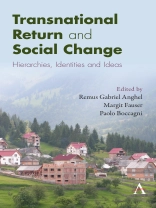Return has long been considered the end of a migration cycle. Today, returnees’ continued transnational ties, practices and resources have become increasingly visible. Transnational Return and Social Change joins what is now a growing fi eld of research and suggests new ways to understand the dynamics of return migration and the social changes that come along. It pays tribute to the meso-level impacts that follow the practices and resources migrant returnees mobilize across borders. With a particular focus on the meso-level the book takes up the challenge of transnational research and enquires into the consequences of return for local communities, organizations, social networks and groups. Presenting a collection of case studies dedicated to migrations across Europe and beyond, this book contributes new insights into the societal impact of migration in pluralized societies.
Inhoudsopgave
Introduction: A Meso-Level Approach to Linking Transnational Return and Social Change, Margit Fauser and Remus G. Anghel; When the Poor Migrate and Return: Class and Status Repositioning among Roma Transnational Returnees, Remus G. Anghel; Minority Institutions, German Transnational Return Migration and Social Change in Transylvania, Ovidiu Oltean; Returns of Failure: Involuntary Return Migration and Social Change in Ghana, Leander Kandilige and Geraldine A. Adiku; Religion, Return Migration and Change in an Emigration Country, Anatolie Coșciug; Diverse Return Mobilities and Evolving Identities among Returnees in Latvia, Aija Lulle, Zaiga Krisjane and Andris Bauls; ‘Be the Change’: Action Strategies and Implicit Knowledge in Transnational Return Migration, Claudia Olivier-Mensah; Polish Returnees’ Livelihood Strategies, Social Remittances and Influence on Communities of Origin, Anne White; Translocal ‘Return’, Social Change and the Value of Transcultural Capital: Second-Generation Turkish Germans in Antalya, Nilay Kilinç and Russell King; Afterword 3×3: Key Contributions, Emerging Questions and Ways Ahead After ‘Transnational Return and Social Change’, Paolo Boccagni; Index.
Over de auteur
Remus Gabriel Anghel is senior researcher at the Romanian Institute for Research on National Minorities and member of the Doctoral School in Political and Communication Sciences at the Babeș-Bolyai University, Cluj Napoca, Romania.
Margit Fauser is senior research and principal investigator at the Faculty of Sociology, University of Bielefeld, Germany. Her main research fi elds are transnational migration, localities and cities, citizenship, borders and social inequalities.
Paolo Boccagni is associate professor at the Department of Sociology and Social Research, University of Trento, Italy. He is also the principal investigator of the ERC St G project HOMIn G – the home-migration nexus (2016–2021).












